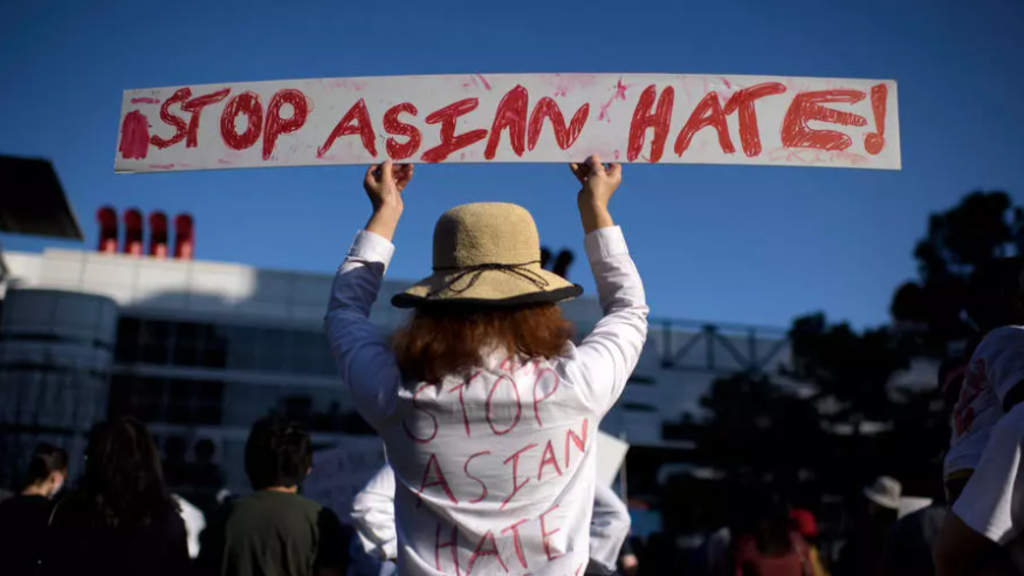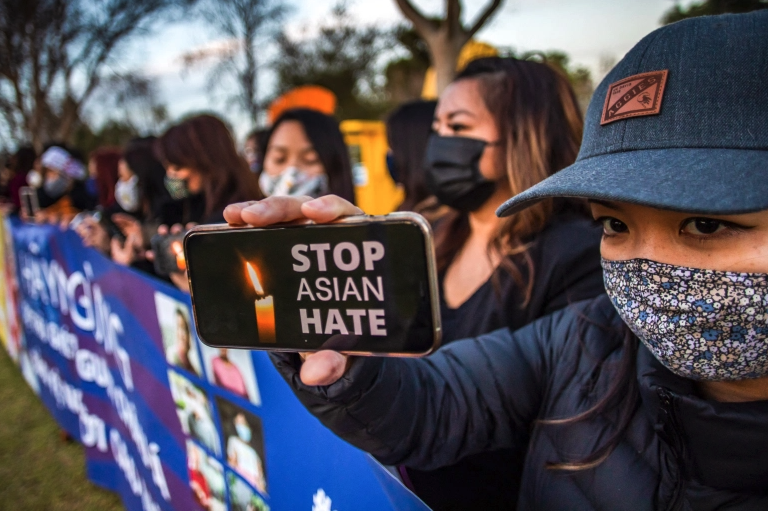“Do you eat dogs?”
“Where are you from, like really from?”
I can’t begin to count how many times I heard these words growing up.
America is heralded by Asian immigrant parents as a land of opportunity and a land where dreams come true.
I shudder when I hear those words. To me, the American Dream isn’t just limited to economics.
This dream should include the social aspects, which unfortunately for many Asian Americans, has been anything but a dream. In fact, it has become a never-ending nightmare.
The racism Asians experience is not limited to beatings and murders. It is packaged into microaggressions and off-hand comments that imply our status as conditional citizens — people whom America embraces with one arm but pushes away with the other.
We cannot enjoy our God-given rights due to markers of identity such as race.
The pandemic and the subsequent hate crimes that followed simply unveiled the ugly underbelly of anti-Asian racism in American society.
This is a deeply personal account of one Asian male’s experience in a country rooted in the chains of racism and where we go from here.
Awareness
Despite being born in the United States, there hasn’t been a time in my life where I felt truly American or even accepted.
The all-American boy doesn’t look like me. The Asian isn’t the hero.
This reality first became apparent to me when I was just six years old. I was attending a private Lutheran school in Southern California and watching a traditional Korean gugak performance with my classmates, 99.9 percent of whom were white.
I remember one of the performers on stage asking the students in the audience if any of them were of Korean descent. A classmate sitting next to me grabbed my hand and tried to make me raise it. I distinctly remember pulling back immediately because I didn’t want to be seen.
That moment will stay with me forever. A six-year-old who was so ashamed of being Asian, a six-year-old who was so ashamed of being different, a six-year-old who didn’t want to be seen.
If only I had known what was to come next.

In high school, the racism was casual yet bold. A female classmate refused to call me by name (Albert Kim) and would instead refer to me as Albert Chow, in a nod to the character portrayed by Ken Jeong in The Hangover.
A random person in public remarked that I looked “okay” for an Asian male.
By the time I reached college, hearing these insulting remarks was the norm. Even basic things such as going out to eat became a problem. When a random group of strangers at a fast-food joint who had struck up a conversation with me decided to call me Kim Jong-un instead of Albert, it was a turning point.
Realization
After spending the last six years living abroad in South Korea, a country where I can live without fear of judgement based on my looks, it has become abundantly clear that American society, and to a bigger extent the media ecosystem, has poisoned the minds of young minorities to make us feel less than.
There is nothing inherently wrong with being Asian.
We are no less attractive or socially adept.
We are just us.
We have our own stories, dreams, fears, and shortcomings.
Yet, that message has yet to reach most of America.
Plight of Asian Males
The media has been focused on the plight of Asian women, and rightfully so.
However, while Asian women are sexualized and viewed as exotic, the males are not afforded the same luxury.
This is not to ignore the struggles of the Asian woman or shove aside the horrific crimes that have targeted them, but we need to have a conversation about the castration of Asian men.
Until recently, our most well-known role models in media amounted to Mr. Chow from The Hangover, a short and effeminate man with a micropenis.
A large body of sociological research has proven that Asian men remain at the bottom of the dating totem pole.
The system has created an image, one that has lasted in the minds of non-Asians, who feel emboldened to spout these damaging lies.
Historical Issues
While the much-needed Black Lives Matter movement pivoted the plight of African-Americans to the forefront, conversations regarding racial equality for Asian Americans have been stunningly silent until the recent explosion in hate crimes.
History textbooks only briefly discuss the internment of Japanese Americans during World War II and the Chinese Exclusion Act of 1882, one of the most racist pieces of legislation in human history that effectively banned Chinese immigration to the United States for 10 years.
It was a law passed by Congress to placate the demands of white workers fearful of Chinese immigrants taking their jobs and assuage concerns related to “racial purity.”
For years, the model minority stereotype has been used as a way to compare Blacks and Asians, and essentially pit the two communities against one another.
Relationship Between the Asian and Black Community
This manipulation has one root: white supremacy.
For years, African-Americans struggled with racist housing policies, over-policing of their communities, and a lack of resources in their schools.
Years of dire economic straits helped breed contempt and sadness in Black neighborhoods and when the Asians came, it was a perfect storm.
Research suggests that the Black community in America felt burdened to compete with new immigrant communities.
Korean-American and African-American Relations
One of the best examples of this struggle is the “conflict” between the Korean-American and African-American communities.
In the mid-1960s, the United States government ended the quota-based immigration system and started pushing for high-skilled laborers to enter the country. One of the groups that was selected included Korean immigrants, many of whom had graduated from prestigious universities in their native land.
However, unable to find jobs befitting of their status and shunned as outcasts by white society, these Korean immigrants resorted to finding employment as small business owners. Many times, the stores they opened were in predominantly Black neighborhoods.
As Koreans immigrants consumed more American media, they started internalizing the stereotypes of Black Americans as violent and uneducated, while on the other side of the coin, Blacks began buying into the stereotype that Koreans were untrustworthy penny pinchers.
This led to a brewing keg of bad blood that was excaberated by the 1992 murder of a 15-year-old Black girl named Latasha Harlins by Korean immigrant Soon Da-ju.
The Reality
What’s interesting is that relations between the Black and Asian community haven’t always been so tense.
When Japanese Americans were sent to internment camps in World War II, Black civil rights leaders tried to repeal President Franklin Roosevelt’s executive order.
Fast foward a few decades later to 1982 and it was African-American activists such as Jesse Jackson who helped bring attention to the murder of Vincent Chin.
The reality is here that the two communities have much more in common than people realize.
Both have suffered under the weight of white supremacy and both need to begin enacting real change.
The Road Ahead
Asian Americans are the fastest growing population in the United States, yet our total representation in Congress stands at a mere three percent.
The New York Times detailed last year how Asian Americans were more likely not to fill out census bureau forms despite their rising numbers. Part of me wonders if this has anything to do with the years of living in silence. Trying to get by, trying not to rock the boat, trying to survive in a new land, trying to be the model minority.
So, what’s the answer to the struggle for racial equality? The truth is: There is no magic bullet or perfect cocktail. We need an “all of the above” approach. But the first step is to be more visible and stop hiding.
Today, a good chunk of younger Asian Americans come from families that immigrated in the latter half of the 20th century due to previous laws that tried to limit Asian immigration.
It’s time for this generation to take the lead. They need to speak up louder than ever before and not be afraid of the inevitable backlash that follows. They have to support and encourage fellow Asians to run for public office and enact real change in legislatures across the nation.
In doing so, we have to reach out to allies and be sure to check our own biases and prejudices.
There are rays of hope if we only look hard enough.
The drama teacher who encouraged me to disregard Hollywood stereotypes and pursue the arts, and the English teacher who pushed me to be the best writer I could be are the people I think about when I remember the good that America has to offer.
I sincerely pray to witness a day where the sunlight is a bit easier to see.
Disclaimer: The views and opinions expressed here are those of the author and do not necessarily reflect the editorial position of The Globe Post.






















